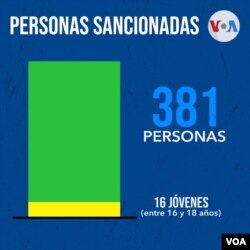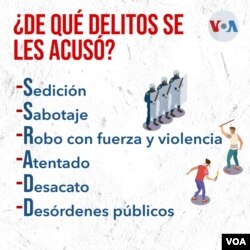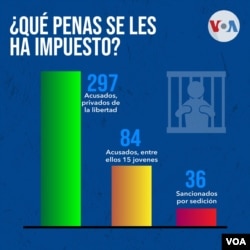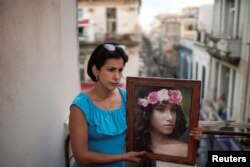On July 11, 2021 thousands of Cubans took to the streets of different cities to demand respect for human rights and improvements in the quality of life.
Experts said at the time that it was the “largest” demonstrations, even surpassing those that occurred in 1994 and that they were known as “El Maleconazo”.
Since the protests a year ago, international organizations, including Human Rights Watch, have been denouncing the arrests that occurred as a result of the protests and maintain that the Cuban government “has committed systematic human rights violations.”
How many people were arrested as a result of the protests?
The organization Prisoner Defenders, based in Madrid, highlights in its most recent report that more than 5,000 people were arrested for demonstrating in different cities of the country a year ago.
“They detained more than 5,000 people, throwing them into trucks, beating and humiliating them and forcing them to say ‘Patria o Muerte’ under the threat of being beaten. The arrest raid continued with the confiscation and search of all the mobile phones of the protesters and the meticulous inspection of social networks, looking for indiscriminate faces of protesters,” the document indicates.
The most recent report by the Human Rights Watch organization, titled “Prison or exile: Systematic repression against the July 2021 protests in Cuba”highlights that “in most of the documented cases, the detainees remained incommunicado for days, weeks and sometimes months, unable to make phone calls or receive visits from their relatives or lawyers. Some were beaten, forced to squat naked or subjected to mistreatment, including sleep deprivation and other abuses, which in some cases amount to torture”.
How many people were sanctioned after the protests?
With the aim of “informing the people about the legal response to the events of July 11, 2021″, the Attorney General’s Office of the Republic of Cuba presented a document on June 13 in which it said that, until now, ” 381 people were sanctioned”.
Human Rights Watch maintains that “Cuban courts have ratified the sentences against more than 380 demonstrators and bystanders, including several children” and that “many trials took place in military courts, in violation of international law.”
The document also denounces that the agents “repeatedly detained people who were peacefully protesting, arrested critics when they were heading to the demonstrations or prohibited them from leaving their homes for days or weeks.”
For its part, the organization Prisoners Defenders, based in Madrid, points out that “the regime took advantage of the occasion to arrest the most prominent human rights activists, such as José Daniel Ferrer or Félix Navarro, and dozens of others.” The institution also highlights the arrest of other leaders, such as “disaffected priests like Father Castor, Protestant pastors like the Reverend Lorenzo Rosales Fajardos, or Yoruba priests like Loreto Hernández García, artists like Luis Manuel Alcántara and the musician Abel González Lescay.”
What crimes were they accused of?
The Attorney General’s Office maintains that those sanctioned were sentenced, fundamentally, “for crimes of sedition, sabotage, robbery with force and violence, attack, contempt and public disorder”
Although the government points out that some of those arrested committed violent acts, organizations such as Prisoner Defenders emphasize that during the protests “there was no violence, except that exerted by state agents and, on rare occasions, the legitimate self-defense of some isolated citizens, that the regime wanted to make believe in vain as something generalized”.
What sentences were imposed on the defendants?
On June 13, the Cuban Prosecutor’s Office maintained that, so far, “381 people have been sanctioned.”
“297 defendants were sentenced to deprivation of liberty, based on the seriousness and circumstances in which the events occurred and personal conduct” highlights the State body.
The note also maintains that 84 defendants “were subsidized the sanction of deprivation of liberty, for other alternative sentences that do not imply -in principle, under the condition of good behavior-, their admission to prison, providing for them correctional work with and without internment, and limitation of liberty”.
Within this group are included 15 of the young people between the ages of 16 and 18.
On the other hand, 36 people were punished “for the crime of sedition”, who face sentences “between 5 and 25 years of deprivation of liberty”.
The Prosecutor’s Office also maintains that the protests “attacked the constitutional order and the stability of the socialist state.” Later, the body added that “according to the seriousness of the facts and degree of participation, 30 were sentenced to imprisonment (20 between five and ten years, and 10 between ten and 18 years), while two they were subsidized for correctional work without internment and one for limitation of freedom; which do not imply -in principle, under the condition of good conduct-, their admission to prison”.
Despite these data provided by the government, organizations and campaigns such as “Look at the prisons of Cuba” maintain that “there is no definitive number of people detained for their participation in the July 2021 protests, it is unknown how many people have been put released, how many remain in State custody and are under investigation”.
Human Rights Watch describes those penalties as “disproportionate.” In addition, the organization highlights that “many protesters and bystanders were convicted based on unreliable or uncorroborated evidence, such as statements exclusively by members of the security forces or alleged “smell prints” of the accused found in stones”.
For its part, the report by Cubalex and Justicia11J, entitled A Year Without Justice: Patterns of State Violence Against 11J Protesters”. points to “irregularities in trials,” which were documented “in provinces such as Santiago de Cuba, Holguín, Cárdenas, Havana.”
“The attempt to hold an oral hearing through a teleconference modality has been observed in the trials, of first or second instance, of demonstrators accused of the crime of sedition, in Havana and Holguín. A marked presence of soldiers has been observed within the rooms where the oral hearing is held. The defendants attended the trials handcuffed and handcuffed,” the document highlights.
Some of those accused by the Prosecutor’s Office were finally acquitted, according to independent organizations.
Connect with the Voice of America! Subscribe to our channel Youtube and turn on notifications, or follow us on social media: Facebook, Twitter and Instagram.
















Add Comment